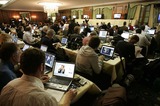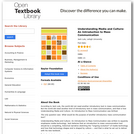
25 Results


The Media
- Subject:
- Political Science
- Material Type:
- Module
- Author:
- Kris Seago
- Date Added:
- 07/26/2018

How are migrants portrayed in the news and media? Who gets to tell the story of migration, and what aspects of the story tend to go underreported? How do these stories, and the perspectives from which they’re told, impact our own perceptions of migration?
In this unit, students learn to identify underreported stories of migration, and what is missing from mainstream media representations of migrants’ experiences. They analyze nonfiction texts and images, practice identifying perspectives in media, and synthesize their learning to form a new understanding of migration. In their final project, students communicate how their perspective on migration has grown or changed through a creative project, original news story, or existing news story edited to provide a more holistic picture of migration.
- Subject:
- Business and Communication
- Communication
- Material Type:
- Lesson Plan
- Provider:
- Pulitzer Center
- Author:
- Emily Otten
- Date Added:
- 06/25/2021

Understanding Media and Culture: An Introduction to Mass Communication was written to squarely emphasize media technology. Jack believes that an introduction to mass communication text should be a compelling, historical narrative sketching the *ongoing evolution* of media technology and how that technology shapes and is shaped by culture — and that is what he set out to deliver with his new textbook.
Today’s students are immersed in media technology. They live in a world of cell phones, smart phones, video games, iPods, laptops, Facebook, Twitter, FourSquare, and more. They fully expect that new technology will be developed tomorrow. Yet students often lack an historical perspective on media technology. They lack knowledge of the social, political and economic forces that shape media technology. This is not knowledge for knowledge’s sake. It is knowledge that can help them understand, comprehend, appreciate, anticipate, shape and control media technology.
With this focus, Understanding Media and Culture becomes an appropriate title. Indeed, the title has particular significance. Marshall McLuhan’s Understanding Media is a key text in media studies. Written in the 1960s, Understanding Media was the subject of intense debates that continue to this day. Its central message was that the technology of media — not their content — was their most important feature. In a typically pithy phrase, McLuhan said, ”The medium is the message.“ The title, Understanding Media and Culture: An Introduction to Mass Communication, situates the introductory text in a large, engrossing theoretical conversation.
The goal is to adopt a textbook that will support and complement your teaching of this course. Jack Lule’s, Understanding Media and Culture: An Introduction to Mass Communication, will support an engaging and interesting course experience for students that will not only show them the powerful social, political and economic forces will affect the future of media technology, but will challenge students to do their part in shaping that future.
- Subject:
- Business and Communication
- Material Type:
- Textbook
- Provider:
- University of Minnesota
- Provider Set:
- University of Minnesota Libraries Publishing
- Author:
- Jack Lule
- Date Added:
- 02/17/2015

The subtitle of this course for the spring 2003 term is "American Television: A Cultural History." The class takes a cultural approach to television's evolution as a technology and system of representation, considering television as a system of storytelling and myth-making, and as a cultural practice, studied from anthropological, literary, and cinematic perspectives. The course focuses on prime-time commercial broadcasting, the medium's technological and economic history, and theoretical perspectives. There is much required viewing as well as readings in media theory and cultural interpretation.
- Subject:
- Anthropology
- Arts and Humanities
- Career and Technical Education
- English Language Arts
- Film and Music Production
- Graphic Arts
- Literature
- Reading Literature
- Social Science
- Visual Arts
- Material Type:
- Full Course
- Provider:
- MIT
- Provider Set:
- MIT OpenCourseWare
- Author:
- Thorburn, David
- Date Added:
- 02/01/2003